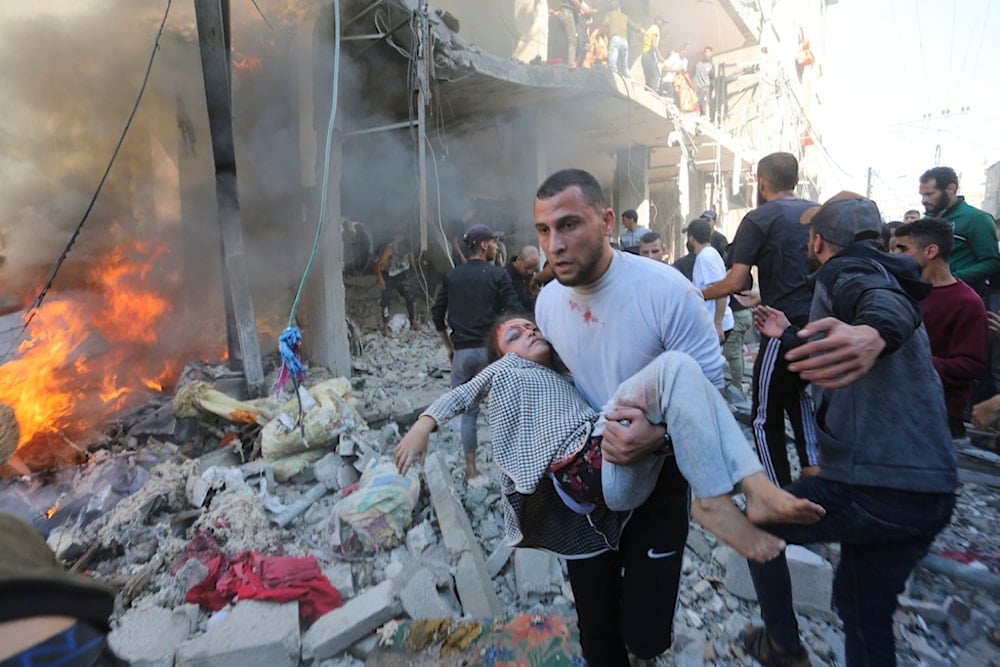We do not believe Israelis will allow displaced to go back: UN Offic.
The Chief of Staff of the Israel Occupation Forces (IOF), Herzi Halevi, announced on Friday that "Israel" is prepared to extend its genocidal campaign beyond northern Gaza.
-

Palestinians rescue survivors after an Israeli strike on Rafah, Gaza Strip, Friday, Nov. 17, 2023 (AP Photo/Hatem Ali)
The Chief of Staff of the Israel Occupation Forces (IOF), Herzi Halevi, announced on Friday that "Israel" is prepared to extend its military campaign beyond northern Gaza.
He said that the IOF is planning to expand its activities in the Gaza Strip with the intention of targeting more areas "and going to kill [resistance] commanders and operatives and destroy the infrastructure."
This comes shortly after the IOF dropped thousands of leaflets over neighborhoods in Khan Younis in southern Gaza, threatening civilians to have them evacuate their homes.
#Israel has dropped leaflets asking the inhabitants of certain neighbourhoods in Khan Younis to evacuate. pic.twitter.com/CC2YNSiw6R
— 𝗡 𝗢 𝗜 𝗦 𝗘 (@NoiseAlerts) November 16, 2023
Meanwhile, aid groups have expressed concern about the mass displacement of civilians, exacerbating the humanitarian crisis.
"Safe" zones
When the war began, "Israel" had threatened almost 1,2 million residents in the north of the Strip to move south.
The IOF also proposed the creation of an alleged "safe zone" in southern Gaza known as Muwasi, encompassing a few square kilometers (approximately 1 square mile). This area is intended to remain free from airstrikes and potentially serve as a hub for the delivery of humanitarian aid.
However, a group of UN agencies has rejected the idea of safe zones set up without the agreement of all parties, warning that such zones could increase humanitarian risks for civilians.
"Under the prevalent conditions, proposals to unilaterally create a safe zone in Gaza risk creating harm for civilians and large-scale loss of life and must be rejected," the heads of some 20 UN and other humanitarian agencies said in a joint statement.
"Concentrating civilians in such zones in the context of active hostilities can raise the risk of attack and additional harm. No safe zone is truly safe when it is declared unilaterally or enforced by the presence of armed forces."
Read more: WHO: Gaza Health Sector buckled to its knees
Israeli ethnic cleansing
Since the start of the war on Gaza, over 1.5 million out of Gaza's 2.3 million people have been forcibly displaced from their homes.
The UN reports that 813,000 of them are staying in overcrowded shelters, leading to the spread of diseases such as acute respiratory illnesses and diarrhea.
There are concerns that Israel and the US are pushing for the creation of a safe zone as a humanitarian solution, given the overcrowded conditions in UN schools serving as shelters for displaced Palestinians.
A UN official expressed skepticism about the feasibility of displaced individuals returning to the north, raising concerns about a potential repeat of the Nakba, an Arabic term for "catastrophe," referring to the mass displacement of Palestinians during the 1948 war that followed the creation of Israel.
"In discussions with the US we have warned against a Nakba 2," said the UN official. "We do not believe the Israelis will allow those displaced from the north to go back," he added, noting that "Now they say they are looking for Hamas leaders in the south so they want to push people out."
Read more: Putin accuses US of failed Middle East policy over Gaza genocide
The proposals for a safe zone are reportedly making Egypt uneasy, as conditions in such a zone could deteriorate, prompting those who can afford it to seek entry into Egypt.
Egypt has been firm in its stance that it is not prepared to host an influx of Palestinian refugees driven out of Gaza.
"Israel's" recent aggressions in Gaza, initiated after the resistance carried out an operation that has monumentally humiliated the regime's intel services and eroded its security apparatus, have resulted in a significant number of martyrs, with almost 11,500 reported by Palestinian health officials.
The Israeli decision to severely restrict supplies of fuel, water, and food to Gaza has further strained the situation, causing most hospitals in the region to cease operations.
Cindy McCain, head of the World Food Programme, has called for additional border crossings to meet the desperate need for food assistance in Gaza and avert the immediate possibility of starvation.

 4 Min Read
4 Min Read








